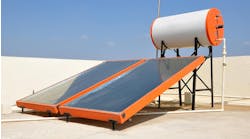Latest from Solar
IAPMO Seeks USHGC Task Group Members
Heat Pumps Get Us to Net Zero
Sponsored
WASHINGTON — The U.S. Department of Commerce has issued a preliminary finding that Chinese manufacturers of certain crystalline silicon photovoltaic solar panels are being illegally subsidized by the Chinese government and dumped in the United States. Commerce announced its preliminary determination June 3, 2014, and said it will issue a final determination if Chinese solar panels should be subject to import duties by mid-August.
Commerce noted that the countervailing duty law provides U.S. business and workers with a transparent and internationally approved mechanism to seek relief from the market distorting effects caused by injurious subsidization of imports into the U.S., establishing an opportunity to compete on a level playing field.
The Department said that it calculated a preliminary subsidy rate of 18.56% for Changzhou Trina Solar Energy Co. Ltd., which includes Trina Solar (Changzhou) Science & Technology Co. Ltd. Wuxi Suntech Power Co. Ltd. and five of its affiliates received a preliminary subsidy rate of 35.21%. All other producers and exporters in China have been assigned a preliminary subsidy rate of 26.89%.
Commerce said that because the Government of China failed to respond completely to certain questions, it applied adverse facts available in determining that certain subsidy programs were subject to countervailing import duties. As a result of the preliminary determination, Commerce said it would instruct U.S. Customs & Border Protection to require cash deposits based on these preliminary rates.
It also noted that the petitioner for this investigation is SolarWorld Industries America Inc.
Reaction to Commerce’s decision was swift on both sides. Many were unhappy, including the Solar Energy Industries Association.
The decision by the Department of Commerce to impose new tariffs on solar modules from China threatens to derail the rapid growth of the U.S. solar industry, according to SEIA. Commerce will immediately impose countervailing duty tariffs ranging from 18.56%-35.21%. Equally troubling, Commerce issued a broad preliminary scope decision, although the Department indicated that it would continue to review comments on this issue.
After reviewing the decision, SEIA President and CEO Rhone Resch said, “These damaging tariffs will increase costs for U.S. solar consumers and, in turn, slow the adoption of solar within the United States. Ironically, the tariffs may provide little to no direct benefit to the sole petitioner SolarWorld, as we saw in the 2012 investigations. It’s time to end this needless litigation with a negotiated solution that addresses SolarWorld’s trade allegations while ensuring the continued growth of the U.S. solar market.
“Over the past few months, SEIA has facilitated settlement discussions between Chinese solar manufacturers and SolarWorld.” Resch continued. “The goal of these discussions is to develop an industry recommendation to help jump-start government-to-government negotiations. Although we’ve succeeded in establishing direct communications between the parties — and are working with all segments of the industry to find a consensus solution — we’re quickly running out of time.”
The Coalition for Affordable Solar Energy, which represents the interests of Chinese solar manufacturers, said that the ruling is a major setback for the entire U.S. solar industry because it will immediately increase the price of solar power and cost
American jobs in one of fastest-growing sectors of the U.S. economy. Much of the dispute revolves around Commerce’s decision to go along with SolarWorld’s definitions of some of the technical aspects of foreign trade law.
“By accepting SolarWorld’s request to expand the scope of the solar dispute, although they are continuing to entertain scope comments, the Department of Commerce is disregarding decades of legal precedent that define scope by applying the ‘country of origin’ and ‘substantial transformation’ trade rules,” CASE said. “The use of SolarWorld’s proposed scope is also fundamentally inconsistent with the Department’s own previous ‘scope’ determination in the 2012 solar cell dispute.”
Of course, the Coalition for American Solar Manufacturing, which is controlled by SolarWorld, and SolarWorld itself were delighted with the ruling.
SolarWorld maintains that in late 2012, when the U.S. crystalline silicon solar manufacturing industry won duties averaging 31% to offset government subsidies that enabled Chinese producers to sell at artificially low prices, that many Chinese producers evaded the duties by commissioning manufacturers in other countries to partially or fully produce solar photovoltaic cells. State-controlled Chinese media said at least 70% of U.S. imports from China contain Taiwanese cells. In that light, SolarWorld filed cases December 31 to close the loophole.
SolarWorld’s trade petitions cover panels assembled in China from Taiwanese or third-country cells made from Chinese inputs. SolarWorld’s petition alleges that Chinese solar producers benefit from an array of government assistance, including cash grants, discounted loans and loan guarantees, free land and utilities, and heavily discounted polysilicon, solar glass and aluminum extrusions.
The Department of Commerce said that it would issue its final opinion on the matter on August 18. The International Trade Commission gets the last word. The ITC determination is due October 3. If the ITC agrees with the Commerce Department, and order requiring the duties will go into effect October 10, 2014.

